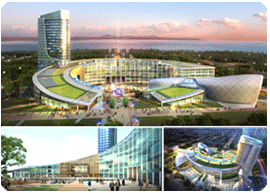Despite the efforts of George Mason University, many students around the Fairfax campus are still unaware of the university’s expansion into South Korea. Starting in March of 2014, Mason will open up programs of study as part of the Songdo Global University Campus. The dream to have an international presence became a reality in 2009 when Mason received a $1 million grant from South Korea.
In an effort to inform students and staff about the Korean program, the University displayed an exhibit in Gallery 123 in the Johnson Center the week of Feb. 4-8th. On display were various artifacts on loan from The Korean Embassy.
The displays included historical paintings and statues, as well as examples of traditional Korean clothing. One of the more noticeable pieces hanging was a full-size traditional Korean Hanbok, a traditional Korean dress.
The exhibit in Gallery 123 also proved to be very informative to the curious student. There was a program staff member on site at all times available to answer questions for visitors. There were also numerous handouts that visitors could take. The exhibit distributed simple one-page brochures, as well as entire packages detailing the full Mason program.

Photo courtesy of GMU Global Affairs
The highlight of the week came on Feb. 5 when Dr. Min Park, a GMU associate professor and executive director of Korea campus operations, spoke at the exhibit. Park gave an overview of the Songdo Global University Campus, including the specific programs George Mason would offer. The University will offer degree programs in management and economics, with 40 spots in each program available their first year.
Park also fielded questions from the audience. GMU will be joined by the University of Utah, Ghent University, as well as the State University of New York.
When asked about the low number of enrollment for the first year, Park said “the University plans to double the number of students in each program through the first four years. There is a growth plan in place.”
Dr. Park also fielded questions about tuition, which is estimated to be at $20,000 a year, as well as the program to incorporate U.S. students. It is not clear when students on the campuses in the U.S. may have the opportunity to study in Korea since the program is under development.
While the exhibit only ran for five days, it is clear that it served its purpose. In regards to the turn out, Park said “People came to learn about what the campus can offer them, and I think we were able to do that”